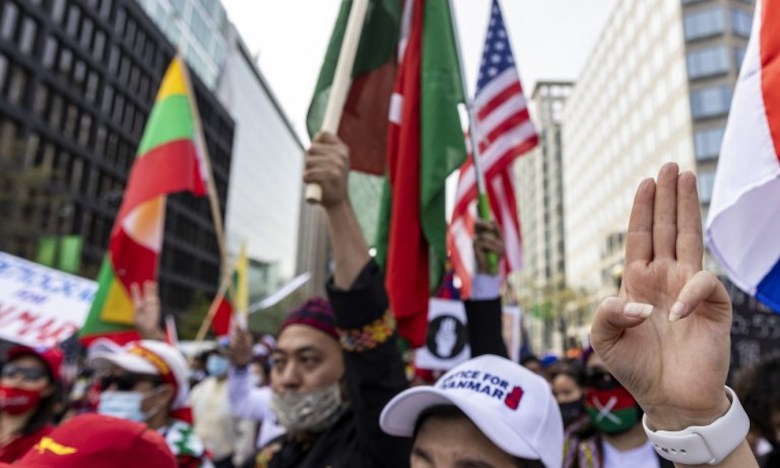Politics
US Congress Advances Three Bills on Myanmar Amid Confusion

On July 22, 2025, three significant bills addressing issues in Myanmar progressed through committees in the US House of Representatives. While the bills face further legislative hurdles, their advancement provides a glimmer of hope for Myanmar’s citizens. The proposed legislation seeks to undermine the military junta’s economic resources, deliver justice for civilian atrocities, and align American foreign policy with pro-democracy forces in Myanmar.
The first bill, the Bringing Real Accountability Via Enforcement in Burma Act, known as the BRAVE Burma Act, focuses on restricting the junta’s financial resources. It mandates that the US government conduct annual reviews to strengthen sanctions against Myanmar’s state-owned enterprises and foreign entities supplying aviation fuel, which the junta employs in aerial assaults on civilians.
The second piece of legislation, the Burma Genocide Accountability and Protection Act, or Burma GAP Act, authorizes humanitarian assistance for Rohingya refugees and internally displaced persons. It supports transitional justice initiatives and advocates for the inclusion of the Rohingya in a future democratic federal system. Additionally, it encourages US engagement with Myanmar’s democratic actors, including the National Unity Government and ethnic resistance organizations, and calls for the appointment of a Special US Representative for Burma.
The final bill, the No New Burma Funds Act, aims to prohibit US support for any new financial assistance from the World Bank to Myanmar’s military regime. While these bills have garnered bipartisan support and favorable committee votes, they must still pass floor votes in the House before moving to the Senate, where the legislative process will begin anew.
Despite the positive momentum, it is crucial to note that the bills authorize potential actions but do not guarantee funding. There is also no assurance that the executive branch will carry out the mandated actions, as evidenced by the incomplete implementation of the Burma Act of 2022.
Just two days later, on July 24, the US Treasury’s Office of Foreign Assets Control unexpectedly removed three Myanmar entities and four individuals from the Specially Designated Nationals list. These individuals had previously been sanctioned for their connections to the military junta, a move that surprised many observers. This decision raises questions about whether it reflects a disconnect within the administration or the influence of lobbying efforts.
To understand these developments, one must consider Myanmar’s military junta’s ongoing quest for international legitimacy. The junta has invested heavily in lobbying firms to enhance its standing. Although immediate recognition remains elusive, the junta aims to stage a manipulated election where its proxy civilian party, the Union Solidarity and Development Party, is set to win, thereby claiming democratic legitimacy.
On July 7, President Donald Trump sent standardized letters announcing new tariff policies to world leaders, including General Min Aung Hlaing, the coup leader. The general later interpreted this correspondence as an implicit recognition of his regime’s legitimacy, requesting sanctions relief and suggesting a high-level negotiation team be sent to Washington, DC. The polished language of his response indicates it may have been crafted by a professional lobbying firm.
On July 19, reports emerged that the junta was planning to send a delegation to negotiate tariff policies, although this was later denied by alleged delegation members. Despite the economic situation in Myanmar not warranting such attention, the granting of US visas to junta representatives would be a significant propaganda victory in their quest for international recognition.
In June, Trump reinstated a “travel ban” that included Myanmar, which should technically prevent junta representatives from entering the United States. However, loopholes exist, as individuals with US permanent residency maintain connections with the junta and American consulting firms.
Additionally, a congressional hearing earlier in 2025 hinted at easing sanctions on Myanmar, justified by the need for relief following a devastating earthquake. In this convoluted political landscape, advocates for Myanmar’s democracy must remain vigilant. They must push for meaningful US legislation while guarding against the covert efforts of lobbyists representing a well-funded regime.
Maintaining focus on these issues is essential for ensuring that US support aligns with the democratic aspirations of the Myanmar people rather than the ambitions of their oppressors. With continued effort and vigilance, the prospects for a free and democratic Myanmar remain within reach.
-

 World5 months ago
World5 months agoSouth Korea’s Foreign Minister Cho Hyun to Visit China This Week
-

 Business5 months ago
Business5 months agoStarling Bank Plans Secondary Share Sale, Targeting $5.4 Billion Valuation
-

 Top Stories5 months ago
Top Stories5 months agoMunsang College Celebrates 100 Years with Grand Ceremony
-

 World5 months ago
World5 months agoPAS Aims to Expand Parliamentary Influence in Upcoming Election
-

 Business7 months ago
Business7 months agoKenvue Dismisses CEO Thibaut Mongon as Strategic Review Advances
-

 Lifestyle6 months ago
Lifestyle6 months agoHumanism Camp Engages 250 Youths in Summer Fest 2025
-

 Sports6 months ago
Sports6 months agoDe Minaur Triumphs at Washington Open After Thrilling Comeback
-

 Sports7 months ago
Sports7 months agoTupou and Daugunu Join First Nations Squad for Lions Clash
-

 Top Stories7 months ago
Top Stories7 months agoColombian Senator Miguel Uribe Shows Signs of Recovery After Attack
-

 World7 months ago
World7 months agoASEAN Gears Up for Historic Joint Meeting of Foreign and Economic Ministers
-

 Health6 months ago
Health6 months agoNew Study Challenges Assumptions About Aging and Inflammation
-

 Business7 months ago
Business7 months agoOil Prices Surge Following New EU Sanctions on Russia









